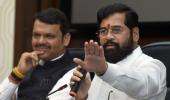Uddhav Thackeray and his followers have the option to stop riding a tiger and commence work around a more meaningful and enduring political ideology.
It is an option Eknath Shinde's side may not have, supported as they were by the BJP, to maintain continuity of the old Sena, argues Shyam G Menon.

The Election Commission of India's recent ruling awarding the bow and arrow symbol to the Eknath Shinde faction of the Shiv Sena and recognising it as the real party, makes for a study in power of two political outfits.
Yes two, because the protagonists are mainly the Bharatiya Janata Party and the Shiv Sena (Uddhav Balasaheb Thackeray).
Shinde's side, although the victor by the ECI's ruling, resembles a trophy on the BJP's shelf besides having the aggrieved party's appeal to the Supreme Court hanging overhead like a Damocles Sword.
On February 22, 2023, the Supreme Court heard the plea of Thackeray's side and issued a notice to the rival camp, but refused to stay the ECI's order.
For the BJP, the ECI's directive of February 17, 2023 was only the latest development linked to a series of past actions that remain a work in progress.
As they continue, the political landscape gets progressively shaped in the BJP's favour.
The ECI's observation that Shinde's team garnered 76 per cent of the votes the Shiv Sena reaped in the 2019 assembly election (and thereby earned greater legitimacy to be the Shiv Sena than Uddhav Thackeray's group) would initially appear clinical and justified.
But think a bit and one is left wondering: How can the 2019 votes be seen as supporting Eknath Shinde's leadership when the Shiv Sena split happened only later, in June 2022?
The split in the Shiv Sena, wasn't without its share of drama.
Following the elections of 2019, the Right to far-Right Shiv Sena decided to partner ideologically different parties (Congress and Nationalist Congress Party) to form the Maha Vikas Aghadi government.
The Right-Wing BJP, which saw itself as natural partner for the far-Right and had been the Shiv Sena's partner in earlier governments.
In June 2022, legislators loyal to Shinde first shifted to a hotel in Surat in BJP-administered Gujarat. Later, they flew to a five-star hotel in Guwahati in BJP-ruled Assam.
By the end of that month, Shinde was Maharashtra's 20th chief minister with former chief minister and BJP leader Devendra Fadnavis as his influential deputy.
In the following months, the Enforcement Directorate served notice to Thackeray loyalist Sanjay Raut, MP. He was arrested and spent 100 days in prison; he got bail in November 2022.
On February 22, 2023, less than a week after the ECI's ruling, The Times of India reported that at a meeting of its national executive in the city, the Shiv Sena (Shinde's team) had decided to vest all decision-making powers in the party's chief leader, Shinde.
The ECI's test of majority using the 2019 state elections as backdrop is not a loophole the Shiv Sena (Uddhav Balasaheb Thackeray) alone can exploit.
Should Thackeray argue that the seats won was a mandate for the unified party under his leadership, the BJP can counter citing the public cast its votes expecting the BJP-Shiv Sena alliance to continue (the alliance collapsed after the elections leading to the formation of the Maha Vikas Aghadi government featuring the Shiv Sena, Congress and NCP).
Further, the ECI's ruling mentions a little known 2018 amendment to the constitution of the Shiv Sena that conferred the power to appoint people to various party positions on a single person and was therefore undemocratic.
At a time when the country's main Opposition party, the Congress, endured (very reluctantly) an internal election to choose its president, such moves on the Sena's part -- including perhaps, the February 2023 decision concentrating powers in Shinde's hands -- will remain questionable.
In turn, the observation of being undemocratic, also raises questions about the ECI.
Why single out the Shiv Sena (Uddhav Balasaheb Thackeray) when parties with little internal democracy is a national problem?

Right now, the dilemma in Thackeray's camp should be of a different sort.
Theirs is a pre-poll challenge and there is a major battle due -- elections to Mumbai's municipal corporation.
This will be the first serious contest between the lead actors in the Shiv Sena's split.
Earlier in November 2022, their first political test in the form of the Andheri (East) by-election, had ended up a virtual walk over for the Shiv Sena (Uddhav Balasaheb Thackeray).
The BJP withdrew its candidate after appeals from many parties to support the candidate fielded by Thackeray's side.
Although the victory was by a sizable margin, the result was noted for the high degree of None of The Above (NOTA) option, exercised in the polls.
The Andheri (East) by-election cannot be considered a test of Uddhav Thackeray's side and its new election symbol -- the flaming torch.
The upcoming elections to the BrihanMumbai Municipal Corporation (BMC) will be the real deal.
The BMC is among the richest civic bodies in India and has been dominated for years by the Sena.
The BJP -- now with Shinde's team on its side -- will try to deny competition space.
They have an advantage courtesy the ECI's ruling, which conferred the title of legitimate Shiv Sena to Shinde's team along with award of the party's traditional symbol.
Thackeray's side has seen its claim to the party's ownership watered down.
It would seem thereby to have lost an easily identified platform from which votes may be sought.
It is like having a bow and a quiver, but no arrows fashioned to reach the target.
Without trustworthy arrows, how to do you fight in a battle for political power? The BJP has Thackeray in a spot.
It was in 1989 that the Shiv Sena, founded on regionalism and Hindu nationalism, commenced an alliance with the BJP.
From the mid-1990s, as part of this alliance, it has been part of governments at the state and central levels.
During its existence, the Sena witnessed several tactical shifts.
Thus, South Indians, Muslims and North Indians -- all have been victims of its violence.
In Mumbai, the Sena and its offshoots were feared for their propensity to be aggressive.
The first time this appeared to change reliably, was in the years following Balasaheb Thackeray's demise (the party's founder passed away in November 2012), especially during Uddhav Thackeray's tenure as chief minister of the MVA government.
In this period of a mellowed down-Sena, it wouldn't be wrong to say that there were those in the city's immigrant public, who preferred the Sena over the BJP and its fringe outfits.
Thackeray's low-profile style of working was also pleasant relief from country bombarded by the BJP's appetite for spin, nationalism and high voltage publicity.
To that extent, Uddhav Thackeray's side of the party receiving a new symbol from the ECI for the Andheri (East) by-election wasn't bad at all.

Abandoning the more approachable avatar of the Shiv Sena carries a risk.
In the years ahead, it won't be tradition, belligerence and smart marketing, but modernity, coexistence and industriousness that will count.
Thus, even as Thackeray's party may seem temporarily disadvantaged by the ECI ruling, it has the luxury of charting a new course.
Thackeray and his followers have the option to stop riding a tiger and commence work around a more meaningful and enduring political ideology.
It is an option Shinde's side may not have, supported as they were by the BJP, to maintain continuity of the old Sena.
Thackeray's new symbol though, wasn't problem-free.
The flaming torch (mashaal) was previously with the Bihar-based Samata Party, which was derecognised by the ECI after its vote share fell.
In early December 2022, The Print Web site reported that the Samata Party, following the Uttar Pradesh Election Commission allotting it the mashaal for a municipal poll, planned to move the Supreme Court against the symbol ending up with Uddhav Thackeray's Shiv Sena.
On February 18, 2023, it was reported that NCP leader Sharad Pawar had recalled a quandary over the election symbol faced by the Congress years ago (during Indira Gandhi's time) and how it managed successfully with a new one -- the hand.
Pawar said Thackeray should accept the ECI's decision along with the new party symbol.
Four days later, on February 22, India Today quoting Pawar said that he suspected there was a bigger power behind the ECI's decision.
'That possibility can't be denied. Something like this has never happened. The entire party has been taken away. What has happened is completely wrong,' Pawar was quoted as saying.
Political analysts have pointed out that Thackeray could find himself challenged if India's all-controlling BJP gets the BMC election positioned close to the present, thus rushing him into election mode prematurely.
Meanwhile, at its national executive meeting of February 21, the Shinde side of the Sena has passed resolutions demanding a Bharat Ratna for Vinayak Damodar 'Veer' Savarkar, classical language status for Marathi, 80 per cent job reservation for sons of the soil in industrial projects and renaming Mumbai's Churchgate Station after C D Deshmukh, the late finance minister.
Shyam G Menon is a Mumbai-based columnist.
Feature Presentation: Aslam Hunani/Rediff.com









